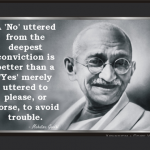January 22, 2016
The Friday Forum today is about…
Business – Is the church or nonprofit a business?
What happens when we don’t use business principles to run the organization?
This blog is titled “The Nonprofit Entrepreneur” because I am an advocate for installing business principles into the culture and processes of charities. I’m not sure that everyone agrees.
Several years ago, the United Methodist Church launched an initiative called “Vital Congregations,” in which there were measurement standards for attendance, growth, and giving. There was a lot of pushback from pastors who didn’t see these as measures of effective ministry. But the denomination knows that we must have quantifiable measurements in order to have sustainability as an enterprise. Both opinions are correct.
Any organization flounders without a core strategy. A strategy is a Solution Map TM which defines where the organization wants to be and how it plans to get there.Without a strategic plan, there’s no effective way to engage faithful stakeholders and build clarity in implementation. Confusion breeds apathy. Without a plan, the organization implements tactics in the absence of on overall strategy, and many tactics will have a higher risk of conflict and some will even cancel others out. This is not helpful when attempting to engage and inspire stakeholders in a church or other charity.
Please comment on the following questions or launch questions of your own:
- Many leaders insist that they have goals and a future vision in their head and that’s all that’s needed, because they lead the way. I know that this is a cop-out and a way to hold infinite power. Why is this irresponsible leadership? Other ideas?
- Talking about money is a problem for many leaders. Psychologists call this a “Money Shadow” in which we repel money with our inner scripts. Why is talking about money taboo in some organizations? Why is it a healthy alternative to talk openly about money?
- Many charities want to measure the unmeasurable. In the church, for example, we rightly share that the impact on people’s lives is only visible over time and mostly not measurable. In purpose-driven charities feeding the hungry, educating the underprivileged, providing health care to those who can’t afford it, etc., why is it important to have quantifiable outcomes?
- Some nonprofit leaders say that having a strategic plan impedes their creativity. I say it’s the opposite. How is having a plan a way to free up creative thinking and collaboration?
Please comment below.













